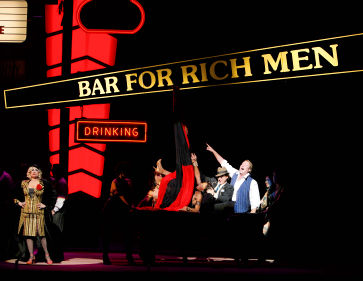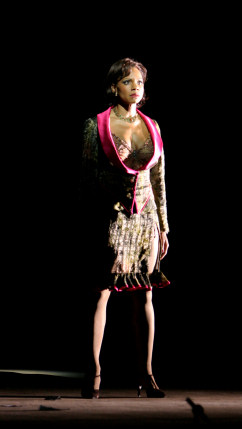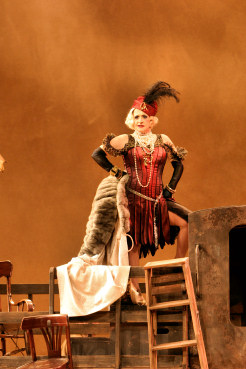|
Editorial Board
Melanie Eskenazi Webmaster:
Bill
Kenny
|
Seen and Heard International
Opera Review
Weill, The Rise and Fall of the City of Mahagonny: Los Angeles Opera, James Conlon, conductor; Dorothy Chandler Pavilion, Los Angeles, 4.03.2007 (HS)
Cast Jenny Smith: Audra McDonald Leocadia Begbick: Patti LuPone James McIntyre: Anthony Dean Griffey Fatty the Bookkeeper: Robert Wörle Trinity Moses: Donnie Ray Albert
Director: John Doyle Set design: Mark Bailey Costume design: Ann Hould-Ward Lighting: Thomas C. Hase Sound: Dan Moses Schreier
It would be difficult to assemble a more suitable cast or a more dedicated conductor for Los Angeles Opera's new production of The Rise and Fall of the City and Mahgonny. A product of the brief collaboration of two giants of the German theater in 1930, composer Kurt Weill and playwright Bertolt Brecht, the piece straddles a no-man's-land somewhere between opera and popular theater, so the choice of Broadway superstars Patti LuPone and Audra McDonald for the female leads makes perfect sense. Tenor Anthony Dean Griffey has the purity of voice to convey the innocence of Jimmy, the male lead in this cynical, tough-minded tale. The supporting cast is strong down the line.
Unfortunately, poorly balanced sound amplification compromised their work, even in the final performance of the run Sunday. The lead voices boomed out too strongly, making the unamplified orchestra and chorus sound weeny in contrast. An announcer's voice, heard through old-fashioned stadium speakers above the stage (and spotlighted), read the title of the coming scene so loudly that it took half the scene to readjust one's ears to the music.,It's like a chef over-seasoning some elements of a meal. The rest might be just fine, but it ruins the whole effect.
And that's too bad, because there were some stunning performances, most notably that of McDonald. An operatically trained singer, she applied a brilliant ear and a four-time Tony-winning actress' understandiing of how to convey all the extra meanings lurking beneath the surface Weill's music, including the famous "Alabama Song."
As Jenny, the prostitute who turns out to have a heart of stone, not gold, she cuts a dazzling figure on the stage, whether in a floor-length red gown cut up to here to reveal shapely legs, or bumping and grinding in a prostitute's lingerie. (Although why it was necessary to dress her up like Condoleeza Rice in the final scenes is a puzzle.)
LuPone has a Broadway belter's voice and the sort of been-there, heard-that stage attitude that suits her character, the madam Leocadia Begbick. Even if there was little chemistry between her and the others, either musically or dramatically, she created a believable character.
Griffey was the brightest musical light in the cast. His work in every scene was totally engaged with the other singers, and his amiable personality gave a sense of reality to Jimmy, who naively believes he is having a real relationship with Jenny. A highlight of the performance was the aria he sings before dawn on the day of his execution for failing to pay his bar bill, when none of those he thought were friends come to his aid, most notably Jenny.
That's the bleak, nihilistic message of Brecht's libretto. Leocadia and her on-the-lam pals establish the city of Mahagonny where their car breaks down. They create a place where the law is beside the point, only the pursuit of pleasure, financed by fleecing visitors seduced by booze, food and loose women. Ultimately, Jimmy loses all his money betting on his pal Alaska Wolf Joe, who is killed in the ensuing boxing match. Drowning his sorrows in whiskey, Jimmy can't pay the tab and a kangaroo court, presided over by Leocadia, sentences him to death.
Brecht was commenting on the loose morals of the Nazi party, which was on the rise in Germany at the time of the piece's composition. But was it really necessary to underline that point by having the ensemble raise a Nazi salute and blare "sieg heil" repeatedly through the sound system at the close of Act I?
Weill's music veers from German cabaret to jazz to purely operatic music reminiscent at times of Bach, Mozart or Schubert, as the dramatic material moves him. The opera proceeds in a series of short scenes, each with its own musical character. Both acts end with a series of ensemble scenes patterned after Mozart's in Don Giovanni or Nozze di Figaro (although in a very different olio of musical styles). Conlon pulled these together with consummate skill, compromised only by those pesky imbalances in amplification.
The production opens on a Brechtian bare stage, which graually fills with a girder here, a highway sign there (Route 666, of course), a hotel marquee and traffic signals, all dropping from the flies. In Act II, a neon sign descends in the familiar diamond shape of the (now gone) Flamingo Hotel in Las Vegas, a gratuitious reference to an American city built on selling pleasure,
Director John Doyle clearly designed these elements to fill the cavernous Dorothy Chandler Pavilion stage. It hardly seemed like they came from the same mind that re-imagined Stephen Sondheim's Sweeney Todd in a cabaret-like production on Broadway last year. In this case he took a work steeped in jazz and German cabaret and blew it up to elephantine proportions.
That, combined with the unbalanced sound, rubbed the sharp edges off of the work. Not good for Brecht, and not quite right for the cynical nature of the story. The strong cast deserved better.
Pictures © Robert Millard
Back to the Top Back to the Index Page |
| ||
|
||||





